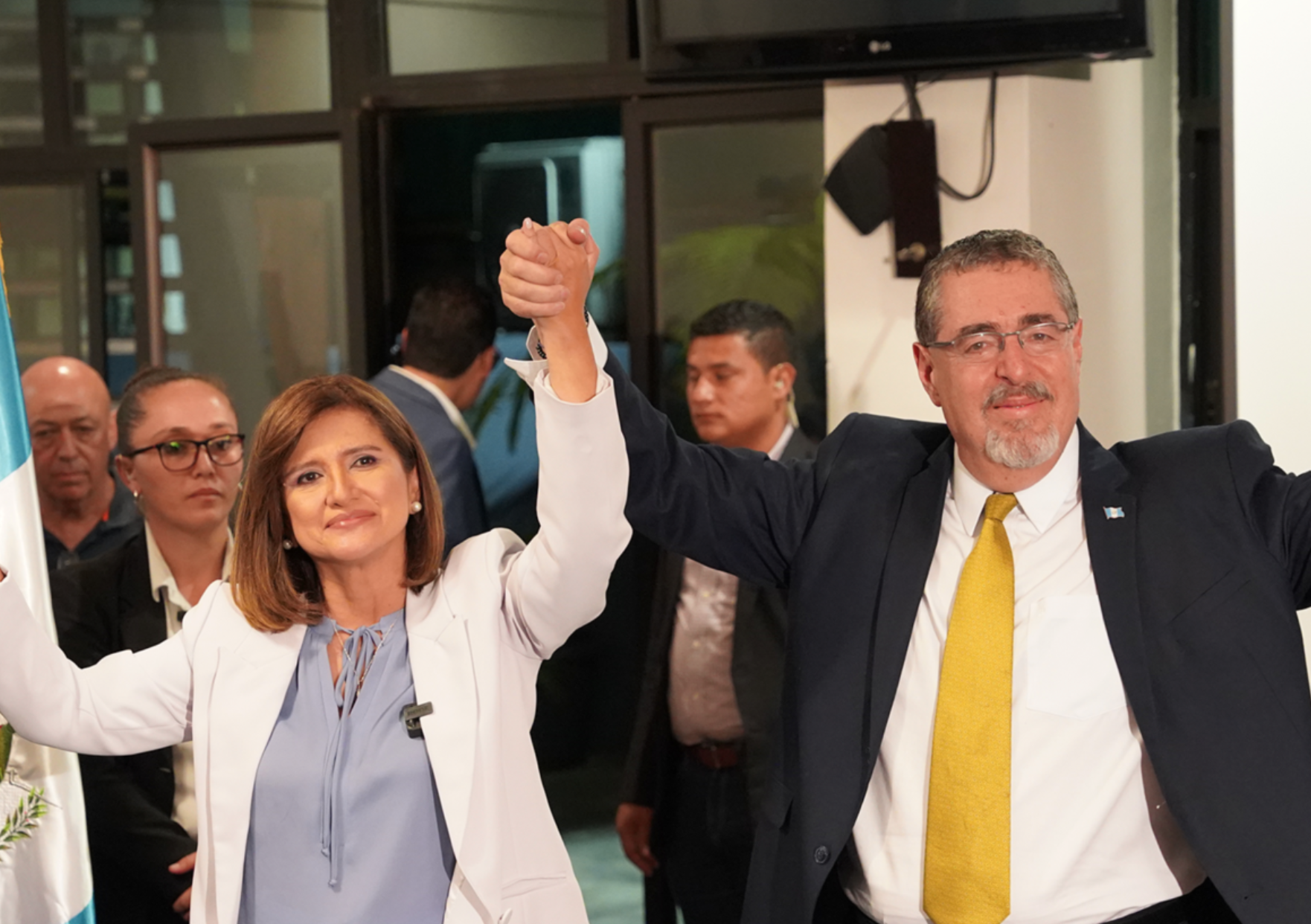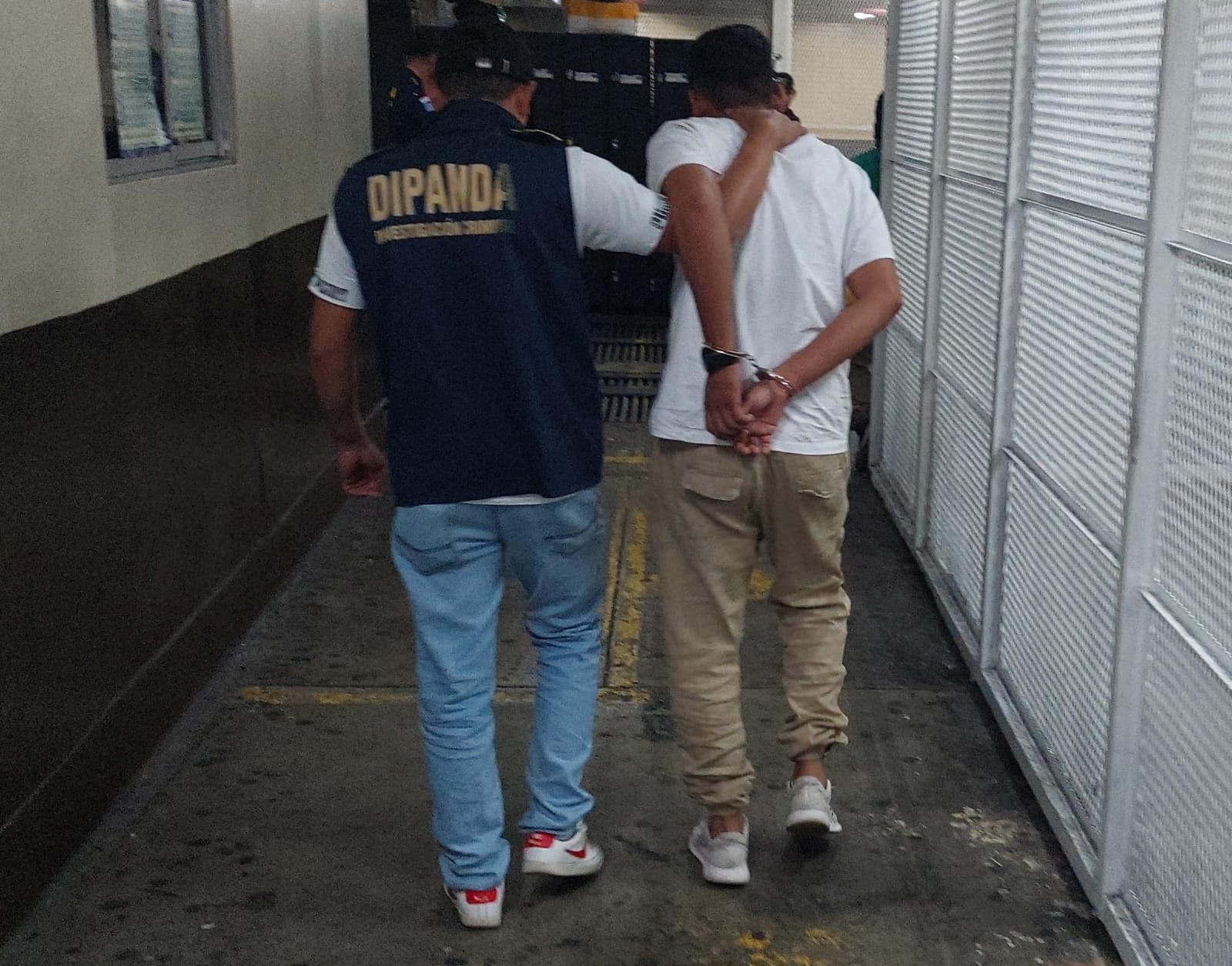Central America
CIDH grants precautionary measures to Guatemala’s presidential binomial-elect

August 25|
Following a petition from the presidential couple elected in Guatemala, the Inter-American Commission on Human Rights issued a resolution requesting Guatemala to adopt the necessary measures to protect the life and personal integrity of César Bernardo Arévalo de León and Karin Herrera Aguilar.
“The Commission considers that the information presented shows that Bernardo Arévalo de León and Karin Herrera Aguilar are in a serious and urgent situation, since their rights to life and personal integrity are at risk of irreparable harm,” the statement said.
The IACHR requested the State of Guatemala to agree with both elected candidates on the measures to be adopted and to report on the actions taken, in order to investigate the facts and avoid their repetition.
According to the document, on August 15, the president-elect’s security team received worrying information about a plan to assassinate him “with the participation of state agents and private individuals”.
The information came from at least three sources within state institutions, with a high degree of reliability, which would have warned about the existence of a plan called “Colosio”, which would be implemented to end Arevalo’s life.
However, this would not be the only threat.
On the night of the day of the second electoral round, after knowing the result of the vote, prosecutors from the Public Prosecutor’s Office met privately with the president-elect to inform him that the Prosecutor’s Office against the Crime of Extortion obtained privileged information, related to criminal gang structures, which could put Arévalo’s life and physical integrity at risk, so they proceeded to make the corresponding notification, in order to take the appropriate security measures.
The IACHR report adds that the requesting party, that is, the president-elect’s team, indicated that, despite the significant increase in danger, “the State had not deactivated the risks through an adequate investigation to determine those responsible for the plan, but, on the contrary, had limited itself to indicating that it had not received any complaints”.
In addition, it states that the presidential couple has a limited contingent granted by the Secretariat of Administrative and Security Affairs -SAAS, which is obliged to provide security to the presidential couple, for which reason they have resorted to private security, given the existing distrust with the State entities under the current context.
It is known that the security scheme consists of 20 agents distributed in shifts and not permanently. In addition, it explains that the president-elect uses a borrowed vehicle with a level 3 armor, below what is recommended by security experts for a person in his risky position, which would require a vehicle with level 7 armor.
And in the case of Karin Herrera, her borrowed vehicle also does not meet the necessary security conditions, while the other members of the Seed Movement do not have any security measures in their favor.
In this regard, in an interview to a television media, the president-elect confirmed that they requested the protection of the IACHR due to the “different forms of harassment, illegal tracking, suspicions of assassination and clear indications that there is some intention to attempt against their lives”.
“We have done so because we believe it is necessary to alert and we for our part are taking the necessary measures to increase security levels”, assured Arevalo.
He also confirmed that the government responded immediately to the IACHR’s request and has already met with the Minister of the Interior and the technical teams are developing the security measures that are necessary in this situation.
Meanwhile, he also indicated that, despite the threats, they are continuing with their agenda: “Karin and I are moving forward with our normal, daily work agenda, already in preparation for the government exercise that will be our turn after January 14.”
The government of Guatemala also issued a statement in which it confirms that, after the meeting with the president-elect, security arrangements will be strengthened and the number of elements will be increased according to the IACHR recommendation.
However, it also calls on the international entity to express itself objectively in order to guarantee impartiality, due to the consequences that its statements may generate.
Central America
Guatemala President Says Starlink Terminal Found Inside Prison

Guatemalan President Bernardo Arévalo revealed on Tuesday that a Starlink terminal was discovered inside a prison in the country, highlighting corruption and the illegal introduction of advanced communication technology into the penitentiary system.
Arévalo did not specify which prison the device was found in but stressed that Starlink’s ability to connect directly to low-orbit satellites makes it particularly difficult to disrupt, posing a serious security risk.
The disclosure was made during a press conference attended by Interior Minister Marco Antonio Villeda and Defense Minister Henry Sáenz.
On January 6, specialized units of Guatemala’s National Civil Police (PNC), members of the Army and prison security personnel carried out Operation Sentinel at the Renovación 1 Maximum Security Prison for Men, located in Escuintla. According to the Interior Ministry, the operation aimed to reduce criminal activity, prevent illicit acts and stop the trafficking of prohibited items inside the prison.
During the operation, authorities also dismantled businesses operating near several prisons after detecting routers that were allegedly used to redirect internet signals into penitentiary facilities, according to local outlet Emisoras Unidas.
Tensions escalated further over the weekend of January 17 and 18, when inmates affiliated with gangs staged riots in three prisons. During the unrest, they took prison guards and a psychologist hostage, demanding extra-large beds, air conditioning, transfers to other facilities and access to the internet.
Central America
Guatemala Police Arrest Prison Guard Caught in the Act of Extortion

Guatemala’s National Civil Police (PNC) arrested a suspected extortionist in the act during an operation carried out in the department of Quiché, authorities reported.
According to the police report, the arrest took place in Zone 1 of Santa Cruz del Quiché after officers responded to a citizen complaint. Agents from Precinct 71 identified the suspect as Encarnación “N”, 41, who was serving as a guard in the Guatemalan Penitentiary System.
The suspect was caught while attempting to collect a package simulating an extortion payment totaling 25,000 quetzales. Police intervened at the precise moment the money was being handed over, allowing authorities to document the crime in flagrante delicto.
Following the operation, the detainee was placed at the disposal of the competent courts to face criminal proceedings.
The PNC emphasized that such operations aim to dismantle criminal structures involved in extortion, regardless of whether those implicated are linked to state institutions, and urged the public to continue reporting these crimes through confidential channels.
Central America
Honduras swears in conservative president Asfura after disputed election

Conservative politician Nasry Asfura assumed the presidency of Honduras on Tuesday with an agenda closely aligned with the United States, a shift that could strain the country’s relationship with China as he seeks to confront the economic and security challenges facing the poorest and most violent nation in Central America.
Asfura’s rise to power, backed by U.S. President Donald Trump, marks the end of four years of left-wing rule and secures Trump another regional ally amid the advance of conservative governments in Chile, Bolivia, Peru, and Argentina.
The 67-year-old former mayor and construction businessman was sworn in during an austere ceremony at the National Congress, following a tightly contested election marred by opposition allegations of fraud and Trump’s threat to cut U.S. aid if his preferred candidate did not prevail.
Grateful for Washington’s support, Asfura—who is of Palestinian descent—traveled to the United States to meet with Secretary of State Marco Rubio, before visiting Israeli Prime Minister Benjamin Netanyahu.
“We need to strengthen relations with our most important trading partner,” Asfura said after being declared the winner of the November 30 election by a narrow margin, following a tense vote count that lasted just over three weeks.
-

 Central America4 days ago
Central America4 days agoGuatemala seizes over a ton of cocaine hidden in flour at Pacific port
-

 International4 days ago
International4 days agoHistoric snowstorm paralyzes Toronto after 60 centimeters of snow
-

 Central America3 days ago
Central America3 days agoGuatemala Police Arrest Prison Guard Caught in the Act of Extortion
-

 Central America3 days ago
Central America3 days agoHonduras swears in conservative president Asfura after disputed election
-

 Central America3 days ago
Central America3 days agoBukele leads public trust rankings as UCA survey highlights gains in security
-

 International4 days ago
International4 days agoSpain’s irregular migrant population rises to 840,000, study finds
-

 International2 days ago
International2 days agoFootball Fan Killed in Clashes After Colombian League Match
-

 International3 days ago
International3 days agoWinter Storm Fern Leaves 30 Dead and Over One Million Without Power Across the U.S.
-

 Central America2 days ago
Central America2 days agoGuatemala President Says Starlink Terminal Found Inside Prison
-

 Sin categoría3 days ago
Sin categoría3 days agoEight Killed in Series of Armed Attacks in Ecuador’s Manabí Province
-

 International3 days ago
International3 days agoDoomsday clock moves to 85 seconds before midnight amid rising global risks
-

 International4 days ago
International4 days agoRights group says nearly 6,000 killed in Iran protest crackdown
-

 International3 days ago
International3 days agoSpain approves plan to regularize up to 500,000 migrants in Historic Shift
-

 Sin categoría3 days ago
Sin categoría3 days agoEl Salvador Launches Fourth Year of Ocean Mission to Protect Marine Ecosystems
-

 International2 days ago
International2 days agoRubio Says U.S. Could Participate in Follow-Up Russia-Ukraine Talks
-

 International2 days ago
International2 days agoMissing Spanish Sailor Rescued After 11 Days Adrift in Mediterranean
-

 International4 days ago
International4 days agoVenezuela frees at least 80 political prisoners, NGO says
-

 International4 days ago
International4 days agoEU launches new probe into X over AI-generated fake nude images
-

 International16 hours ago
International16 hours agoU.S. Senate Rejects Budget, Bringing Government Closer to Shutdown Amid DHS Dispute
-

 International4 days ago
International4 days agoSevere winter storm grips U.S., leaves multiple dead as extreme cold persists
-

 International4 days ago
International4 days agoFrance debates ban on social media for children under 15
-

 International16 hours ago
International16 hours agoStorm Kristin Kills Five in Portugal, Leaves Nearly 500,000 Without Power
-

 International16 hours ago
International16 hours agoMan Arrested After Vehicle Crashes Into Jewish Institution in Brooklyn
-

 International16 hours ago
International16 hours agoTrump Says Putin Agreed to One-Week Halt in Attacks on Ukraine Amid Extreme Cold


























